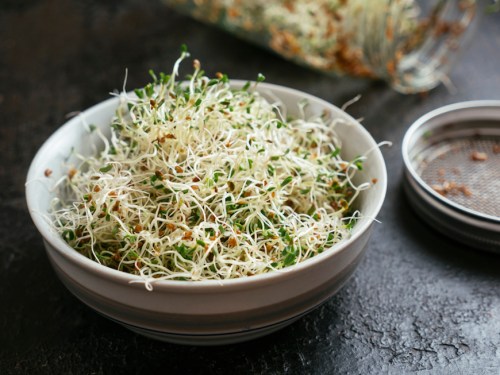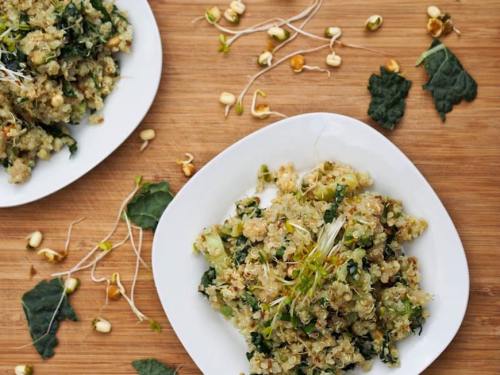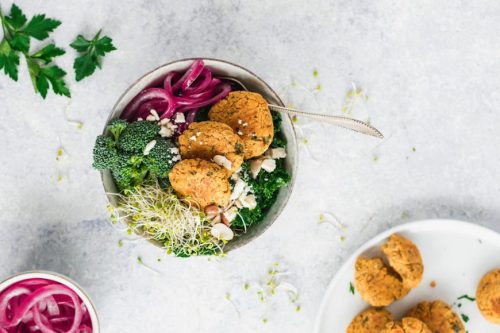How to work more alfalfa into your life, the plant that’s a legume *and* an herb
See a list of alfalfa benefits with input from a registered dietitian. Plus, get three ways for how to cook with alfalfa and up your intake.

As far as healthy underdogs go, alfalfa is pretty up there. It’s not at all buzzy, like ashwagandha or collagen, nor is it a healthy food chameleon like cauliflower or chickpeas. Alfalfa has always lurked in the background of the healthy food scene, popping up every once in a while on sandwiches or in salads. Which is probably why its many benefits have been overlooked.
Let the record show that alfalfa has been vastly underrated. For those of you who have been under the assumption that alfalfa is a Little Rascals character and nothing more, here’s a little education: Alfalfa is an herb that’s also considered a legume. (See, things are already getting interesting.) It’s primarily grown in the U.S. and is often used as feed for livestock and as a cover crop (meaning a crop planted between harvests to regenerate the soil).
However, it’s worth adding to your own diet because of all of its nutritional value. Here, registered dietitian Dana Hunnes, PhD, RD, explains the surprising health benefits offered up by alfalfa. Plus, get ideas on how to incorporate the plant into more of your meals.
What are the major alfalfa benefits?
1. Alfalfa can help keep your bones strong. One cup of alfalfa has 11 milligrams of calcium, (you want to aim to get 1,000 milligrams a day), which Dr. Hunnes says can help contribute to bone health and preventing osteoporosis. Is it a huge amount? No, but it’s a nice drop in the nutritional bucket that will help you get there.
2. It’s another plant-based source of iron. If you don’t eat meat, getting enough iron can be tricky (you need at least 18 milligrams per day), but alfalfa can help in that department with 0.3 milligrams per cup. “Iron is important for your blood and this is a great source to obtain this nutrient that isn’t sourced from animals,” Dr. Hunnes says. Iron is an important component of hemoglobin, which is a substance in red blood cells that helps oxygen flow through the body.
3. Alfalfa is hydrating. Alfalfa is a hydrating plant, with 30 grams of water in every cup. This is one reason why upping your consumption could help with your complexion; dermatologists’ number one tip is virtually always to drink enough water and fill your diet with hydrating plants.
4. It’s a natural source of folate. PSA: Women who are pregnant are not the only ones who need to stay on top of their folate game. Getting enough folate (300 to 400 micrograms a day), is important for cardiovascular health and stroke prevention. One cup has 12 micrograms, which can contribute to reaching that goal.
5. Alfalfa is a plant-based protein. “Alfalfa a good source of plant-based protein if you are eating the alfalfa bean itself,” Dr. Hunnes says. This is part of what makes alfalfa so unique and great; it’s a herb-legume hybrid bringing benefits of both.
6. It has potassium. One cup of alfalfa has 23 milligrams of potassium, which can be used in the body to balance out sodium and contribute to good cardiovascular health.
8. Alfalfa has vitamin C. One serving of alfalfa has 2.7 milligrams of vitamin C, part of the 75 milligrams you want to get a day. Getting enough vitamin C is important for keeping your immune system on point, protecting the body against free radicals, and metabolizing protein—so load up!
As you can see, alfalfa is a surprisingly nutrient-rich plant, and Dr. Hunnes says there are no negatives to eating it. Keep reading to see three ways to work it into your meals.
3 ways to eat more alfalfa

1. Add it to your salads and grain bowls
One of the easiest ways to add more alfalfa to your life is to combine it with other greens or grains, like quinoa or farrow. This recipe from Avocado Pesto food blogger Vicky Berman combines it with kale, quinoa , avocado, and cucumber for a gluten-free, vegan salad.

2. Use it as a base for poached eggs
For a more unexpected way to cook with alfalfa, check out this recipe from The Doctor’s Kitchen blogger and integrative physician Rupy Aujla, MD. Dr. Aujla combines alfalfa sprouts with other powerhouse ingredients including Brussels sprouts, extra virgin olive oil, and eggs.
Watch the video below to see why one registered dietitian calls eggs “nature’s multivitamin”:

3. Have them with falafel
This recipe from Well-fed Soul blogger and physician assistant Kasey Goins doubles down on the plant protein thanks to the alfalfa—plus sweet potato, which just makes it that much yummier. The end result is a high-fiber meal that’s both nourishing and delicious.
More healthy foods you may be sleeping on: wheatgrass and spaghetti squash.
Sign Up for Our Daily Newsletter
Get all the latest in wellness, trends, food, fitness, beauty, and more delivered right to your inbox.
Got it, you've been added to our email list.










